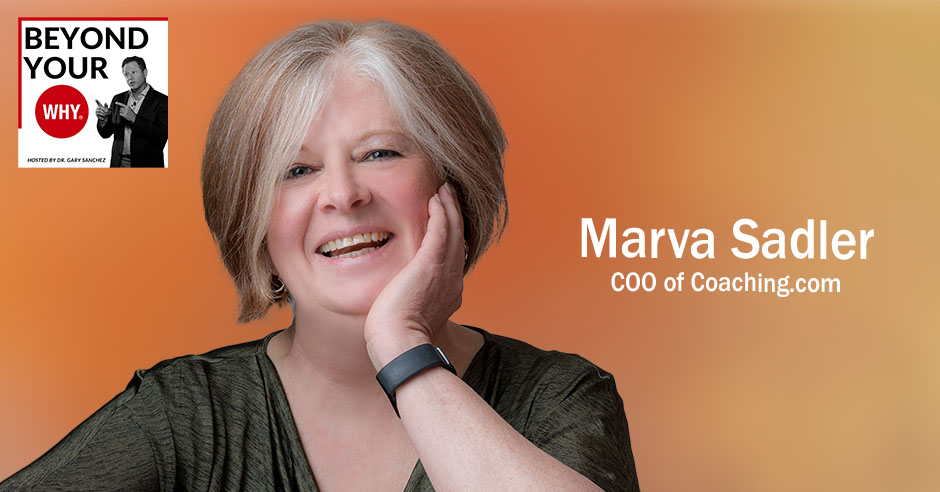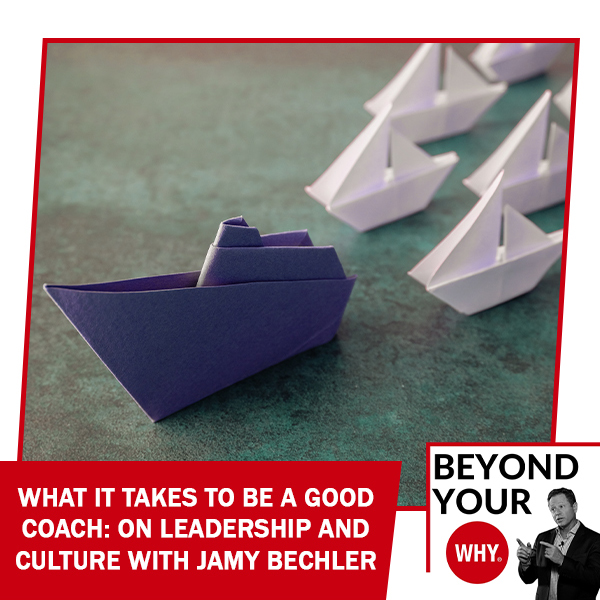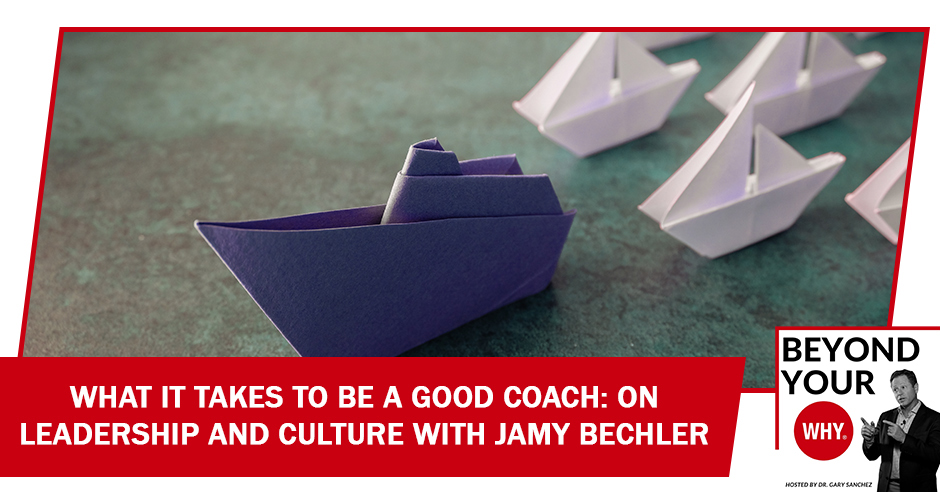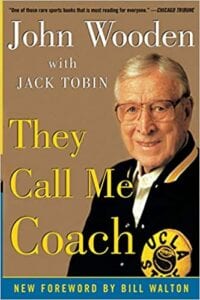
Are you someone who is driven to solve problems and resolve challenging or complex situations and you often find yourself helping people get unstuck and move progress, your WHY is of making sense. And one with such a purpose is Marva Sadler, COO of Coaching.com. She is an experienced business executive and consultant with over 20 years leading strategic and operational growth programs for small to mid-sized organizations. She also has extensive expertise in strategy creation, leadership development and executive coaching. In this episode, she talks about how childhood experience can shape one’s WHYs and shares the perspective of a middle child who developed a unique ability to find solutions quickly and the gift for articulating and summarizing them clearly in understandable language. She also gives us an overview on how their platform allow enterprises to find great coaches and help coaches manage their coaching projects. If you are passionate about making sense out of a situation and developing simple solutions, this is an episode you don’t want to miss!
—
Watch the episode here
Listen to the podcast here
Marva Sadler: Growing Up Too Fast And Making Sense
In this episode, we are going to be talking about the Why of Make Sense, to make sense out of things, especially if they are complex and complicated. If this is your why, then you were driven to solve problems and resolve challenging and complex situations. You have an uncanny ability to take in lots of data and information. You tend to observe situations and circumstances around you and sort through them to quickly create solutions that are sensible and easy to implement.
You are often viewed as an expert because of your unique ability to find solutions quickly. You also have a gift for articulating solutions and summarizing them clearly in an understandable language. You believe that many people are stuck and that if they could just make sense out of their situation, they could develop simple solutions and move forward. In essence, you help people get unstuck and move forward. I’ve got a great guest for you. Her name is Marva Sadler. She is the COO of Coaching.com. She joined the organization in September of 2021 when the company acquired WBECS, where she was CEO.
She is an experienced business executive and consultant with many years of leading strategic and operational growth programs for small to midsize organizations. She also has extensive expertise in strategy creation, leadership development, and executive coaching. Prior to joining WBECS, Marva held executive management positions like CVP, CFO, and CEO in large organizations, including Franklin Covey and AchieveGlobal.
Marva also has substantial experience across a variety of industries, leading small private organizations through startup and turnaround efforts, including positions as CEO of Veracity Solutions, a software development consulting firm, President of Hoggan Health Industries, a commercial fitness equipment manufacturer, and Chief Operating Officer of eLeaderTech, a startup software firm.
She began her career in strategy consulting with international strategy firm Marakon Associates and Bain & Company. She has also served in the nonprofit sector as Program Director for People Helping People, an employment success program for low-income women, primarily single moms, and as a board member and strategic advisor for No More Homeless Pets of Utah. Marva, welcome to the show.
Thanks, Gary. You make me sound much better than I deserve.
That was a mouthful. That tells us that you have done an awful lot in your career so far.
It’s, in part, tied to my why, interestingly.
It’s funny when I was going through your bio there. The positions that you’ve held are all perfect for somebody who has the why of makes sense. That’s why people bring you in. Make sense of this thing and then move forward.
If anybody else picked up on it, I tend to have a little bit of a career ADD. You will notice that there are a lot of different positions in a lot of different industries doing different things because I’m driven by problem-solving. My passion is about, “Let me go find a new problem that I haven’t solved yet.” I’m always drawn to complex problems. If I haven’t solved it yet, it probably means it’s because in an industry I haven’t been in, if I haven’t seen it yet, it’s because it’s a whole new thing.
For those of you that are familiar with the Why OS, the why, how, and what, Marva’s why is to make sense of the complex and challenging. How she does that is by making things simple and easy to understand. Ultimately, what she brings is a way to contribute, add value, and have an impact on the lives of others. How does that feel to you, Marva?
You're killing yourself by working long hours because you're stressing your body so much that it's in complete rejection of everything. Click To TweetIt feels dead on. I had a friend once when I was at AchieveGlobal. There was an executive meeting I couldn’t attend. She said, “It’s okay, Marva. We will just get a little Marva bubble head doll and set her up on the table. Every five minutes or so, we will pop the head of the bubble doll and say, ‘We need to simplify.'”
Let’s go back to your life now. Take us back to when you were in high school. Where did you grow up? Tell us what you were like in high school. Were people always coming to you as someone to help them with their issues?
No. It’s more of I was going to people to help them with their issues. I will give you a little bit of background that is relevant. I grew up in Utah. That’s already going to create images for people. It’s a pretty conservative state. It has a very hierarchical, prevailing religion, which says, or at least said when I was in high school, “Women should be homemakers and mothers,” and that’s our ultimate responsibility in life.
I had a woman in my neighborhood, the mother of one of my friends, who told me when I was about eighteen that I could go on an LDS mission if I wanted to when I turned 21 but I needed to understand that it would be because I’d already failed at my real mission in life, which was to get married and have children. That was the environment I grew up in. I was, by nature, a bit of a rebel. I thought, “I didn’t get this brain so I could just raise kids and be a baby factory.” I realized that’s a pretty strong statement.
I also came from a family of eight kids. I was number six. I had this very strong need to be seen by my parents because when you are a number 6 out of 8, you are in the middle of the crowd. You are not old enough to have been interesting in the beginning and not young enough to get the attention of being the youngest. My response to that was if there were something that I thought I could excel in, I would go after it because I was looking for something that I could do and excel at, that my parents would go, “Wow.”
Unfortunately, my mother was of Danish origin. Scandinavians basically never say, “Wow.” They always say, “Someone else could have done that.” I would come to her and say I just did and fill in the blank, “I became a National Merit finalist.” Her answer would be, “Your sister already did that.” “I got this big scholarship.” “Your brother already did that.” I kept racking up new things that I would try like debate championships and all kinds of things, trying to find something that one of my siblings hadn’t already done. I admit freely that this obsessive need to excel was based on the fact that I was number 6 out of 8. A lot of my energy went into that.
When you were even younger, say 5, 6 or 7, were you in a position where you had to grow up fast and be more of an adult at a young age?
Absolutely. There was a six-year gap between my next older sister and me, and a six-year gap between my next younger sister and me. My dad got very sick when I was about three. My mom had to go to work to support the family. She would drop me off at the babysitter every day. My siblings did not pick me up after school. They were busy with all their own things. I was at the babysitter until my mother could finally come and get me. It caused a real strong drive for independence on my part. I won’t go into all the details. There were a number of situations where, even at a very young age, I had to rescue myself.
One of the simpler examples was I didn’t like the babysitter because her little boy beat up on me up every day. I was about three. One day, I begged my mother to let me walk to the babysitter because I wanted some time and attention. She was in a hurry, so she tossed me in the car and got in, and I opened the door, and she drove off. I fell off, and she ran over me. She broke my arm. The tire ran over the upper part of my arm and broke my arm. I was lucky it didn’t hit my head. That would have been the end. I ended up with this cast on my arm.
When I went back to the babysitter a few days later, this little boy started beating up on me again. I had complained to the babysitter, and that hadn’t worked. I complained to my mother, and she told me to deal with it. When that task got hard enough, he beat up on me, and I whacked him across the head with that cast. I did that until he left me alone. That was the beginning of me recognizing, “I’m going to have to get myself out of whatever the situations are.” That would be my version of I grew up fast and came to rely on myself very early.
That is interesting because that’s very common. It’s the same story with everybody that has the why of makes sense. I was wondering about it because when you told me where and how you grew up, typically, I will see that scenario play out as one of the parents was a mess and the child had to grow up fast to be the protector of the rest of the family. I was curious how that was going to play out with you. You surprised me because I thought maybe it wasn’t going to play out that way but you did have to do the same thing. You were the one that you had to protect.

Let me tell you the rest of the story. I got these 5 older siblings and 2 younger siblings. My mother was 45 when my youngest sister was born. She was done before I was born. She was just done. My dad was 51 when my youngest sister was born. They got to a point where he was off doing consulting work for Armco Steel. He would take my mother with him. As soon as I got to the point where I could drive, I became the surrogate parent for my two little sisters. They would leave us for weeks at a time.
They would leave me with grocery money, tell me to behave myself, and make sure the girls got up, got to school, came home, and were fed. I would take care of them for 2 or 3 weeks at a time. My parents would come back, wave, say hello, and disappear again. That went on through college. My one younger sister, she and my mom didn’t get along. I would go home every weekend when I was in college just to take the pressure off my little sister. When I moved away after graduate school, I invited her to come to live with me for a while so that we could break that cycle and she could gain some independence and learn to do some things on her own.
I remember my older siblings. When my little sister went on an LDS mission, we all congregated to hear her say her farewell. One of my sisters came up to me and said, “I thought you were a selfish witch to ask her to be your nanny because I thought you were doing it entirely for yourself so that you would have cheap childcare. I now realize that wasn’t your motivation at all. You were trying to get her out of a bad situation so that she could change the way she felt about herself. Look at what you’ve done. She’s now ready to fly.” I find it sad that my family would have that attitude about me, that I would be that selfish. My little sister doesn’t feel that way about me. I guess it’s okay.
I can imagine that even way back when you were good at what you did, were very capable, and had a high capacity because that’s right in line with the why of make sense. Other people can look at that and think, “She thinks she knows it all. She thinks she’s all this.” You were forced into that situation.
I leaned into it. There must have been something in my nature, to begin with, that caused me to find that as my solution and problem solving instead of withdrawing or being a victim. I chose that way to deal with it.
Where did you go to college? You went to BYU, right?
I went to BYU for both my undergraduate and graduate degree.
You got your undergrad at BYU. What was your graduate degree?
I got my undergraduate degree in Broadcast Journalism. I wanted to be the next Woodward or Bernstein. I loved journalism and broadcasting. I thought I was going to be a famous TV news anchor. I then fell in love with radio and realized that radio had the benefit of anonymity but also a lot more creativity. I wrote documentaries for a radio station for about a year and a half in New York City. I went back to graduate school thinking I would become a business journalist because business journalism was a big deal.
I figured that’s how I could make money. I fell in love with the business. I thought, “Where have you been in my life?” The world makes sense to me. It seemed like a whole series of problem-solving that I could use. Instead of just reporting about businesses and the problems they were having, I could get involved and solve the problems that they were having. I found it that much more interesting.
Did you start a business or did you become a business consultant?
Training is the poor cousin to coaching. Those of us who were in the training business knew that coaching could eat us for lunch any day because the results were better. Click To TweetI became a Strategy Consultant with Bain & Company. I got recruited by the famous Mitt Romney himself right out of grad school.
What was that like for you?
It was a mixture of heaven and hell. From an intellectual perspective, it was fabulous. I interacted every day with the smartest people on the planet who were driven the way I was to solve problems, find simplicity, understand patterns, and find solutions. From that perspective, it was amazing. From the human perspective, it was tough.
I was the first female consultant who had children because, by the time I got out of graduate school, I had one child. I had him right after I finished graduate school. I then stayed and taught for a year while my husband finished his undergraduate. By the time I was done with that, I had two kids. I started as a strategy consultant with two children, which was unheard of for a female. From a personal perspective, it was hard.
To give you an idea, this was back in the early ’80s. I had a manager who finally came to me one day and said, “Marva, you are better than getting experience.” He said, “I tried to put you on a project that I thought you would be good at. The managing director wouldn’t let me do it because he said you are not allowed to travel.” I said, “What?” He said, “He’s made this decision because you have kids, you shouldn’t ever travel. You’re never going to get on a project that takes you away from home.” Being me, I walked down to the managing director’s office, knocked on his door, and said, “Can I have a minute of your time?” He was a little surprised to see me. He then invited me in.
I stood there in his office and said, “I understand you’ve made a decision about the direction of my career and that you’ve decided that because I’m a mother, I can’t travel.” He said, “I was doing you a favor.” I said, “No, you weren’t. You are killing my career. It’s none of your business. I have the right to make that decision for myself. It is not your decision to make.” I literally used those words.
He stood there and said, “I was trying to do you a favor.” I said, “That is not a favor. You have put me on the mommy track. It’s not your decision to make. I would appreciate it if you would withdraw that restriction.” In retaliation, he put me on a project that he thought was going to take me to France. I went but it was a turning point in my career because I was no longer on that mommy track. I was headed towards failure. I wasn’t willing to accept that.
You weren’t getting valued for who you were but held back because you had kids.
It was my decision to make. It was my problem to solve. It was not something that I needed somebody else to solve for me.
You were there for how long?
I was there for almost five years.

Where did you go? Keep us going on your path.
I then took a leave of absence because I was pregnant with my third child and had some complications. I couldn’t work for a while. At that time, my husband was working for NYNEX, which was one of the big Baby Bells that then became Verizon. He was working there with an international development group. He got transferred to White Plains, New York. We moved to New York.
I took a long bit of a sabbatical and went back to work for a strategy firm called Marakon Associates, which were the inventors of value-based management, which was the marriage of strategy with financial parameters. The idea was that you could create long-term strategies based on projected cashflows. You could understand what the drivers were of a business by understanding what created cashflows because the value is all created in cashflow, not in revenue or profits.
It was a very new concept at that time.
It was a pretty new concept. The reason they were interested in me is that they wanted to understand how Bain did strategy work. They only did financial strategy work at the time. I had been a Manager at Bain on my way towards partner when I left. I joined Marakon as a Manager and helped them understand how you could apply these financial rules to developing strategies. It was a lot of fun. I got a reputation of being the person who would take brand new projects nobody had ever heard of and figure out how to turn them into a solution that we could then replicate and that we could use the new concept that had been developed to sell to another client.
That didn’t surprise me at all. You were there for how long?
I was there for three and a half years.
After that, where did you go?
I then had a personal epiphany. I was living in New York in the Hudson River Valley. I developed some symptoms that looked very much like multiple sclerosis. I was losing feeling in my hands and feet. I was losing sight in one eye. I had some pretty serious health problems. I went to a neurologist who told me I had MS. He said, “It’s chronic, progressive, and debilitating. You will be in a wheelchair and die. I suggest you try to figure out how you are going to take care of your kids.”
I wouldn’t accept that. I thought, “At least maybe I can slow it down if I take care of some of the other issues I have.” I went to see a good allergist who said, “The good news is you don’t have multiple sclerosis. The bad news is you are killing yourself because you’ve stressed your body so much, working twenty-hour days for so long that your body is in complete rejection of everything. You are going to have to change your eating, lifestyle, where you live, and everything else but I can make you healthy again.”
I got to where I was doing a lot better. I thought I was going to tough it out. It turned out that one of my kids got very sick from a spider bite. Once he was out of the hospital, I took him to see this allergist. The allergist looked at me after he tested him. He said, “If you won’t get out of here for yourself, get out of here for your kids because they’ve got the same issues. You need to go someplace that freezes hard in the winter and doesn’t have mold in the air.” He had a couple of other stipulations. We then moved back to Utah.
If your WHY is making sense, you’ll have a tendency to give advice more than you should. Click To TweetWe moved back to Utah partly to take care of my parents because I took care of my sisters. I’m the caregiver. We went back to take care of my parents. I started a PhD program in Finance at the University of Utah and realized I was not cut out to be an academic. I had professors who would talk about these theories and then go, “We are PhDs. We don’t need to use them. Those stupid MBAs would ask how would I use this theory but as PhDs, we just need to know it’s a theory.” I raised my hand one day and said, “I’ve used that theory.” The professor said, “Really? Somebody uses this crap?” I thought, “I don’t belong here.” I went back to consulting for IBM.
You took a step back to consulting for IBM. How was that for you?
It was a lot of fun. I saw a lot of the world. I ran a program to teach IBM executives in the Asia Pacific how to do services consulting instead of how to sell boxes. I got to see a lot of Asia. I then took it around to the ISSC, the services corporation that was a division inside the US. From there, I did a couple of other things. My husband and I bought a historic Woolen Mill in Northern Utah and brought it back into operation.
Why would you do that?
It was something he wanted to do. I realized that he wasn’t going to be able to do it without my operational knowledge. We did that for about five years.
Did you eventually get into coaching?
I eventually went back to work as a Finance Director for what became AchieveGlobal, then became the CFO at AchieveGlobal. From AchieveGlobal, I went to Franklin Covey as an Executive Vice President. Training is the poor cousin to coaching. Those of us who were in the training business knew that coaching could eat us for lunch any day because the results were better. That’s how I got from training into professional services and by way of a couple of detours. That’s where my background came from that I ended up in coaching.
Were you ever a coach? Were you out coaching other people or mainly working with groups of coaches?
I have never been a coach. I tell people I’m much more of a consultant than a coach. I don’t have formal coach training. I have done a lot of small business consulting in my time where I take the entrepreneur or the small team and help them think through how to think about their business differently. A lot of that ends up being leadership coaching but I’m not going to call myself a coach because I don’t have that classic training. Given my why, I have a tendency to give advice more than I should.
From WBECS, you got to Coaching.com as they got bought out. I don’t know if you remember what I said to you way back years ago now when we were talking. It was before all the dot-com happened.
It was in the midst of trying to sell the company but I couldn’t tell you that at the time.

You were the CEO but whoever gets you is going to be awfully lucky because you are that person that’s going to help them solve all. You can take in much stuff and simplify it down to where it’s useful so that it can have an impact on their lives. It shows up everywhere in your life from the time you were twelve years old or younger, even.
Maybe younger. It’s a theme.
You have been coaching since you were the mother to your two sisters because of what you did for them. You coached them through a lot of stuff.
My little sister was saying something to me. She was asking me something about childhood. I had said, “I went to the babysitter for years. Nobody would come and pick me up.” She said, “My family would never have done that to me.” She looked at me and said, “That’s because you are my family.” I said, “It’s because I knew what it felt like. I would never desert you like that or leave you to your own devices.”
Are your parents still alive?
No. Do you think I would have said those things if they were still alive? I was responsible for taking care of my parents for almost twenty years. I didn’t live with them but I lived around the corner from them so that I could pay attention to them for several years. My dad got sick, and we worked through that. I had to put my mom in an assisted living center. I was responsible all that time. Once my mom died, I took over the financial responsibility for my oldest sister and did that for about ten years before she passed away.
Here’s a question I have. Have you ever had a time in your life when life was easy, where it wasn’t a whole lot of stuff coming at you all the time? Has that ever happened?
Does that ever happen to anybody, honestly?
I think so. You’ve probably had opportunities where things could have slowed down but then, “I decided I was going to get my PhD.” You take on massive things, not just like, “I will learn how to knit,” or something. It’s more like, “I’m going to go get my PhD. I will consult with IBM.” Those are not minor little excursions for most people.
Those are direct, intentional choices that I’m making. I will give you an example of what I do in my spare time. I watched a YouTube video and learned how to create a drip irrigation system for my flower beds because it has been hot here in the Columbia River Gorge where I live. I bought this stuff. Every night, I build 1 irrigation system for 1 of my flower beds. I then called a mulch company and had them deliver 7 cubic yards of tree bark. Once I build the irrigation system, then I put the tree bark down.
That’s what I do for recreation. It’s a choice that I’m making. Quite honestly, I don’t know what to do with my time if I’m not doing something interesting and challenging where I’m learning something new. That, to me, is boring. My youngest son said to me, “Mom, you have two gears, neutral and overdrive. You are either in complete overdrive where you are going or sitting very quietly reading something, doing nothing. You don’t have anything in between.”
Coaching.com is not in the business of brokering specific coaches. We're in the business of matchmaking. Click To TweetTell us about Coaching.com. It bought out WBECS. How are they different? We have a lot of coaches that read but for those people that don’t know, tell us what WBECS and Coaching.com were.
WBECS was known for the World Business & Executive Coach Summit, an annual free summit that we run for three weeks in June 2022, which features the world’s best coaching and leadership thought leaders. This 2022, Susan David was one of our headliners. Susan David is considered one of the Top 10 Thinkers in the world now. We attract some pretty impressive people. Last 2021, our headliner was Adam Grant. I measure my success by whether my children have ever heard of these people. My daughter, I had dinner with her.
She was shrugging over Ray Dalio because Ray Dalio was also one of our headliners. She was like, “I’ve never heard of him.” She’s a doctor, so she doesn’t care about business. When I got to Susan David, she knew who Susan David was. When I got to Adam Grant, she was impressed. I thought, “I’ve succeeded. My daughter is impressed with something that I’ve done.” That’s what WBECS is most famous for. We have a database of about 100,000 coaches, primarily independent solopreneurs and in the business leadership executive coaching arena. We also run high-end educational programs that we run live and virtual globally.
We’ve had people from 140 countries take our programs with thought leaders like David Peterson or David Drake, who are well known in coaching for being independent, creative, and innovative, thought leaders in areas of coaching. That’s what we are known for. It’s this business-to-coach orientation with this great database of coaches and educational content.
Coaching.com is a software platform. Their primary focus has always been on creating a coach management system for large enterprises that have big coaching projects to be able to manage those coaching projects in a way where they can track and manage the coaches, coaching sessions, and the feedback. They can do all that. They were very good at technology and software.
WBECS was very good at education and marketing. We put the two together so that we could have a two-sided ecosystem with the emphasis from Coaching.com on the enterprises and the emphasis from WBECS on the coaches to try to persuade the coaches to get on the coach version of the platform so that the enterprises could access these great coaches. Enterprises are always asking, “Is there an easier way for us to find coaches for our executives? Is there a way for us to find qualified coaches that we don’t have to go and contract with them individually or whatever?”
We are a little bit better than a lot of people compare us to or ASAP. We are neutral. We are not trying to tell the coach how to coach, what to coach, how to price or what kind of coaching to do. We are saying, “Put yourself on the platform and tell people what your specialty is.” With the enterprises, we are saying, “Go and find the coach you want to find, either contract with them directly or through a coaching company that represents a group of coaches.” Our job is to be the marketplace that brings the two together.
We are never going to take sides around which methodology you should use or what training you should get. We are going to say, “We are going to give you access to a lot of great assessments, products, and education so that you can continue to develop your skills.” For the enterprises, they can say what their criteria are, and the coaches can meet those criteria. We are not in the business of brokering specific coaches. We are in the business of matchmaking. It’s like a dating platform for the coaching and the people who use coaching. Everything that we’ve done since then has been to build on that business model.
We are now in the midst of creating partnerships with organizations that have things that are very useful to the coaches, enterprises or users of coaching so that we can create a closed system. By getting the education or the certification, the coach also becomes part of the platform. They can sell their coaching based on the fact that they are certified to do that coaching.
We are trying to find a way to create more of a marketplace for coaches. At WBECS, our mission was to raise the global standard of coaching. One of the ways that you have to do that is to create opportunities for coaches to get better at coaching but also create opportunities for coaches to do more coaching so that they can get better and get paid for what they do.
You are speaking my language. That is for sure. Coaching.com has been around for how long?
Marshall Goldsmith said “Ask yourself the questions: Does it need to be said? Do you need to say it? Does it need to be said now?” Click To TweetCoaching.com started in 2012 as Coach Logics, Inc. Alex Pascal, the Owner, and CEO was a PhD IO Psychologist. He worked for the Center for Creative Leadership, CCL. He had this notion that there were better ways to scale coaching to take the administrivia out of the coaching so that coaches could spend more of their time coaching and less of their time in all the administration and management functions of coaching. That’s what the Coaching.com platform is intended to do. It’s to streamline all that and make the connections to the people they coach much easier to manage so that they can become much more effective coaches and spend a higher proportion of their time coaching.
For those coaches that are reading, head over to Coaching.com and take a look at it.
It’s because the first level of use of the platform is completely free. They can have access to scheduling, feedback, calendaring, and even a paywall. They can have access to all of that and not pay anything to be on the platform. They can put up their profiles so that they can be viewed by the enterprise clients within a month or so by external people looking for coaches. They can learn a lot from our marketplace.
The first step is free. They get access to all the stuff to help them run their business. If they want more, they can get into the education, certification, and different areas to help them grow and be able to offer more. I got one last question for you. What’s the best piece of advice you’ve ever given or the best piece of advice ever given to you?
The best piece of advice that was ever given to me was given to a lot of people, not just me. Marshall Goldsmith said, “Ask yourself the question, ‘Does it need to be said? Do you need to say it? Does it need to be said now?'” Since I’m a person who has a tendency to be a know-it-all and want to give the solution and frequently see the solution before other people see it, I don’t mean that in an arrogant way, although I’m pretty sure it sounds pretty arrogant.
As a leader, it’s easy for me to just jump in and solve the problem for people. I have those questions up where I can see them. If people can get to the answer themselves, even if it’s not exactly what the answer would be that I would get to, it’s more powerful for them. They learn more. It’s easier for them to implement. We get more creativity out of the group if I don’t step in and give them the answer.
I try to remember that. “Does it need to be said by me?” It’s because, as the leader, they are all going to have to agree with me. “Even if it needs to be said, and by me, does it need to be said in this public forum? Is there some other way I could have that conversation with an individual?” That is probably the best advice that I’ve received that I use on a regular basis.
That was super helpful because that’s a big challenge. Everybody with the why of makes sense said what you just said right there, “They are way ahead of the rest of us. You have to dumb yourself down to let us catch up.” What happened to you when you didn’t follow that series of questions or ignored that?
Mostly, I feel bad because it shuts down the conversation. It shuts down creativity. It ends the development of the individuals. I’m dedicated to people’s professional development. I disappoint myself because I cut off avenues to growth. Frequently, if I give the answer, it takes us longer to get there because anybody who has a different answer, feels like they have to justify a different answer because they are now combating the person that’s the leader instead of just offering an idea.
It’s fascinating because people with the why of making sense are so capable, have a such high capacity, are so fast, and good at doing almost anything that people stop doing what they can do and leave it for you to do because you are going to do it better and faster anyway. You then become the bottleneck. Your capacity becomes the level at which we can grow.
It’s because people are all waiting for me to give them an answer. The way to solve that is to quit giving answers and start saying, “I trust you. What do you think? You are more of an expert in this area than I am. What is your recommendation?” Handing it back to people is one of the hardest things I do every day.
As a leader, people are all waiting for you to give an answer. But the way to solve that is to quit giving answers, start showing trust in your team’s expertise and ask for their recommendations. Click To TweetI can imagine because we had somebody on our team with your why. He was so good at everything that I ended up finally watching him. I just sit and watch him like, “You do it because you are going to do it better, faster, quicker, and easier than I am.” He ended up becoming the bottleneck. We ended up having to part ways because we could only grow as fast as he had capacity.
If I can help other people get to where they contribute and somehow spread that, then my influence is significantly greater than if I’m the one that’s making all the decisions or taking all the actions.
I have been looking forward to our conversation for a long time because we talked long before about doing this. It’s taken us a while to get into it but had I not known your Why OS? If I had seen your picture, let’s say I’m looking through LinkedIn and, “There’s Marva Sadler right there. There’s your picture.” Could I tell from your picture, bio or anything that you have available to me any of this stuff about you? Is there any way I would have known just looking at your picture?
From the bio, probably yes. Looking at my picture, that’s a pretty deceptive picture. It’s probably the one picture I’ve ever had taken of me where I look like I’m having a good time because I always look like I don’t trust the camera.
It’s fascinating because even though I knew your why of make sense, I was curious to see how it all is played out. It makes total sense now that I know your history and how you grew up. I learned a lot more and our audience as well. No way I would have been able to tell that from your picture or probably even if I watched a video of you speaking somewhere. It would be very challenging. Now that I know, it makes communicating, connecting, and understanding you so much easier.
Frankly, if you had laid out the whys in front of me and said, “Pick which one is you,” I’m not sure if I would have been able to accurately say, “This one is me. This is my how.” As soon as I read the descriptions after I had taken the test, I was like, “That makes a lot of sense.”
Marva, if there are people that want to connect with you, follow you, or follow Coaching.com, what’s the best way for them to connect with you?
They can certainly find me on LinkedIn. That’s probably the easiest way. They can also find Coaching.com on LinkedIn. They are also welcome to email me. I don’t always get back right away but I try to answer emails regularly. It’s simple. It’s Marva@Coaching.com.
Marva, thank you so much for being here. I enjoyed our conversation. I look forward to staying in touch and working with you guys because you got a great organization there. It’s growing leaps and bounds now.
We are on the fast track. It’s so exciting. There are so many things that we are doing that the merger created the ability for us to take paths that neither one of us could have taken on our own.
That’s awesome. Thank you so much for being here.
Thank you.
Important Links
- Coaching.com
- LinkedIn – Marva Sadler
- LinkedIn – Coaching.com
- Marva@Coaching.com
About Marva Sadler
 Ms. Sadler is COO of Coaching.com. She joined the organization in September 2021 when the company acquired WBECS, where she was CEO. She is an experienced business executive and consultant with over 20 years leading strategic and operational growth programs for small to mid-sized organizations. She also has extensive expertise in strategy creation, leadership development and executive coaching. Prior to joining WBECS, Ms. Sadler held executive management positions (EVP, CFO, and CEO) in large organizations, including Franklin Covey, and Achieve Global, Ms. Sadler also has substantial experience across a variety of industries, leading small, private organizations through start-up and turnaround efforts, including positions as CEO of Veracity Solutions, Inc., a software development consulting firm, President of Hoggan Health Industries, a commercial fitness equipment manufacturer, and Chief Operating Officer of eLeaderTech, a start-up software firm. She began her career in strategy consulting with international strategy firms Marakon Associates, and Bain and Co. She has also served in the nonprofit sector as Program Director for People Helping People, an employment success program for low-income women, primarily single moms, and as a Board Member and strategic advisor for No More Homeless Pets of Utah. Ms. Sadler is a certified Theory of Constraints Jonah.
Ms. Sadler is COO of Coaching.com. She joined the organization in September 2021 when the company acquired WBECS, where she was CEO. She is an experienced business executive and consultant with over 20 years leading strategic and operational growth programs for small to mid-sized organizations. She also has extensive expertise in strategy creation, leadership development and executive coaching. Prior to joining WBECS, Ms. Sadler held executive management positions (EVP, CFO, and CEO) in large organizations, including Franklin Covey, and Achieve Global, Ms. Sadler also has substantial experience across a variety of industries, leading small, private organizations through start-up and turnaround efforts, including positions as CEO of Veracity Solutions, Inc., a software development consulting firm, President of Hoggan Health Industries, a commercial fitness equipment manufacturer, and Chief Operating Officer of eLeaderTech, a start-up software firm. She began her career in strategy consulting with international strategy firms Marakon Associates, and Bain and Co. She has also served in the nonprofit sector as Program Director for People Helping People, an employment success program for low-income women, primarily single moms, and as a Board Member and strategic advisor for No More Homeless Pets of Utah. Ms. Sadler is a certified Theory of Constraints Jonah.







 Jamy Bechler is an author, motivational speaker, leadership consultant, and host of the popular “Success is a Choice” podcast. With a background as a championship athletic director, award-winning college basketball coach, and business consultant, he works with high-level sports teams and businesses helping them maximize results. He is recognized as an expert in leadership, culture, and teamwork.
Jamy Bechler is an author, motivational speaker, leadership consultant, and host of the popular “Success is a Choice” podcast. With a background as a championship athletic director, award-winning college basketball coach, and business consultant, he works with high-level sports teams and businesses helping them maximize results. He is recognized as an expert in leadership, culture, and teamwork.